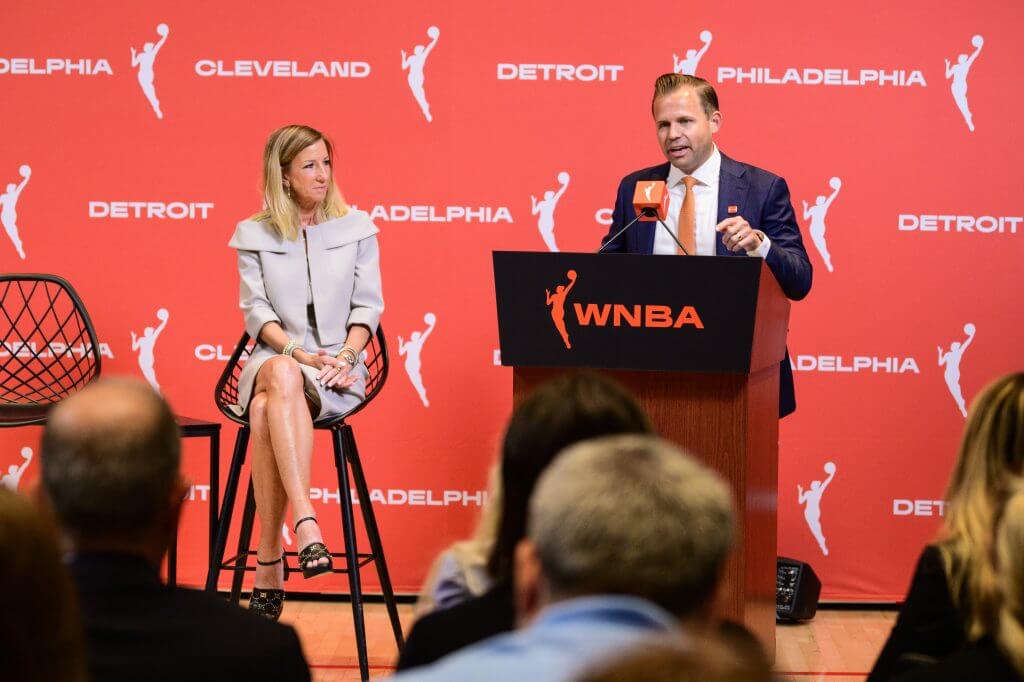This week marked a historic moment for the WNBA with the announcement of three new expansion teams set to play by 2030. The league’s growth since 2020 has continued to expand beyond expectations. The first of these new teams will debut in Cleveland in 2028, marking the WNBA’s return to the city where the original Cleveland Rockers, one of the league’s eight founding teams, played until 2003.
Early ticket sales suggest strong community support in Cleveland, with over 3,100 season ticket deposits already made, according to Nic Barlage, CEO of Rock Entertainment Group, which owns the new WNBA franchise as well as the NBA’s Cavaliers. Barlage shared that their journey to securing the team began three years ago as interest in women’s sports grew within their sports portfolio. He also explained the motivation behind potentially reviving the Rockers’ name and why this moment is right for investing in a WNBA franchise.
When asked about securing the team, Barlage highlighted their growing involvement in women’s sports, including partnerships with local events like the WTA 250 and attempts to bring professional women’s soccer to Cleveland. Although soccer efforts didn’t succeed, the WNBA became a primary focus. With Dan Gilbert, the chairman, deeply passionate about basketball and equal opportunities, and seeing a rise in young female participants in their youth academy, the timing was right.
Cleveland’s enthusiasm for women’s basketball was evident during the sold-out Women’s Final Four in 2024, pushing the group to pursue ownership aggressively. They learned of their successful bid near the NBA All-Star weekend and emphasized Cleveland’s strong sports culture, which has been a vital part of the city’s recent revitalization. The projection is that the investment will contribute $1.1 billion into local sports infrastructure, making the team part of a broader community and economic impact.
Regarding the team’s brand, Barlage stated that while the Rockers’ legacy is respected and remains an option, the franchise is taking a deliberate, thoughtful approach involving community input before finalizing the name and identity. This distinguishes Cleveland’s approach from other expansion teams like Portland, which leans toward reviving the "Fire" name, showing a trend of blending nostalgia with future growth.
Bidding for these expansion teams was highly competitive, reflecting rising interest in women’s sports. Barlage considered Cleveland’s proposal among the most prepared, supported by strong community passion and existing sports infrastructure. He also mentioned the strategic advantage of NBA ownership backing, which offers commercial, management, marketing, and venue resources critical to the WNBA’s expansion and success.
The $250 million expansion fee, the highest in WNBA history and far exceeding previous fees, was seen not just as a financial commitment but a reflection of the league’s growing stature and trajectory. Barlage underscored that the motivation wasn’t purely financial but driven by the impact on the community and the sport’s rapid growth indicators, like attendance and viewership.
Owning a local sports network also gives the Cleveland franchise a unique edge in marketing and fan engagement. With the league’s bright future anticipated, Barlage envisions the WNBA growing to 25 or 30 teams, expanding schedules, playoff formats, and media rights. He believes the league will soon reach new heights, with valuations possibly reaching into the billions over time.
In conclusion, the return of the WNBA to Cleveland symbolizes a new era where historic roots meet modern enthusiasm, bolstered by significant investment and community support.
Fan Take: This exciting expansion signals enormous growth for the WNBA, bringing new energy and opportunities to a passionate city like Cleveland. For fans, it represents not just more teams to cheer for but a testament to the rising prominence and sustainability of women’s professional basketball.



